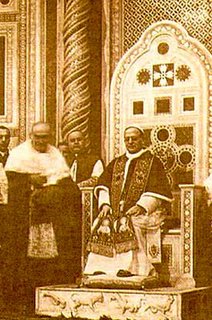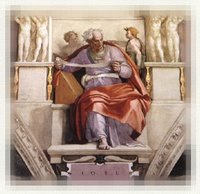
Moment of Conversion
What Is Up With Modern Evangelicals?
The early to mid 1900's have seen an escalation of theological nuances which are either ridiculous, or truly heretical. Among these, we find the "importance" of issues such as Numerology, End-times "date" calculation, an unbelievable amount of codes and hidden cryptograms pointing to secret gospels or doctrines, and the one issue which has been bugging me the most: Point of Conversion Experiences.
I'd give you the Scriptural text for the basis of this "Conversion Experience," except that it doesn't exist.
Never (until the mid 1900's) do you find Orthodox Theologians advocating this sort of experiential situation. Even many more recent Theologians cannot point to their exact moment of conversion. For instance: C. S. Lewis tells us that he only knows that he left his home not believing that Christ was the Son of God, and arrived at his destination believing.
Point of conversion? Not sure, but Lewis affirms that he was definitely converted.
What about John Gill? At the age of twelve, Gill heard a sermon on the text, "And the Lord called unto Adam, and said unto him, where art thou?" (Genesis 3:9). It was not until seven years later that young John made a public profession when he was almost nineteen years of age.
Point of conversion? Not sure, but Gill affirms that he was definitely converted.
What about Augustine of Hippo?
Hilary of Poitiers?
Basil the Great?
Clement of Alexandria?
Ignatius of Antioch?
Irenaeus of Lyons?
Justin Martyr?
For every one of them who has a story of conversion, there are one or two who have no story or experience which they can share.
And why? Because a conversion experience is not needful to truly be saved.
For instance: Sir Walter Scott writes to us that he can never recall a time in which he did not believe as he finally came to in his later years. We know this to be true of much of Scotland, since the Kirks were - at one time - bound together internally very tightly. The infrastructure of the Scottish Kirks has continued to astound economists to this day. (See: proftellsall.blogspot.com for an article on the subject.)
Thus, it stands to reason that Scott may not be able to recall a time at which he doubted the validity of the gospels, since he was taught them from his youth up.
What of the account of Philip and the Ethiopian eunuch? Was the eunuch saved while he read Isaiah? When he desired some man to explain it to him? When Philip explained it? When he verbally affirmed his belief?
My own story is similar. As the son of a Minister, I was always (as far as I can recall) familiar with the gospels, and never doubted their validity.
I am not suggesting that I was always a Christian, not at all. Simply that I cannot point to a specific date and say, "here, I was converted."
In this sense, I think the Presbyterians like me, under the misconception that I endorse Covenant Salvation.
But the idea is actually this:
Can I testify of the exact moment of my salvation? No.
Can I testify that I am indeed saved, and affirm all that is true according to the Scriptures? Yes.
Is it required by Scripture that I provide this exact date or moment? Not at all.
Ultimately, the requirement is not a Roman's Road outline, nor is it an evangelical outburst of emotion. It is not a "moment" of salvation, nor is it a whispered prayer at an altar.
It is an inworking of redemptive grace from the Father. It is a work which He alone can do.
Monday, January 08, 2007
Wednesday, August 16, 2006

A Journey In Grace
How His Eye Infused That Ray...
I don't usually write personal articles, i.e., ones that deal with my life...my experiences, but we'll make an exception.
I am the child of a Minister.
Reformed...Orthodox...Protestant.
You might imagine that I understood the Doctrines of Grace before I knew my multiplication tables...not so.
How exactly does one know the moment of one's conversion?
I remember understanding as a child...or at least, knowing that Christ's death was real, and that it was the payment for my sin...But it was until some time later that I realised what that truly meant; the ultimate effect of that transaction. I still am not able to pinpoint the "moment" of my conversion, however...
Several years ago, my Family had just been exposed to Reformed Theology; we still had not seen its beauty, not yet tasted the succulent nectar in the centre of the Tulip...(pardon my obvious comparison)
I remember reading Richard P. Belcher, A Journey In Grace, & when I got to the part about John Newton's Amazing Grace, I sat upright and sort-of looked at it twice.
I had never before viewed the words like I did then...I once was lost, but now am found.
In a way (don't go legal on me), it was like a second conversion. A reformation, if you will. I knew the doctrine of Efficacious Grace, but I finally realised the doctrine of Grace as we know it in the Reformed sense.
As I read the words, I knew nothing of hyper, really nothing of Calvin, nothing of supralapsarianism...
I knew nothing, save Christ. This is the ideal which the Reformation embodied...
Solus Christos.
Tuesday, August 08, 2006

Ignorance of the Law: no excuse?
Reformed Protestants hold to the line of thought which says that men will die condemned if God does not regenerate their heart through the Holy Spirit. This means, even if they die on some backwater island with no knowledge of Salvation or the Scriptures, they are still condemned.
Armenien brethren would argue (not all, of course - let's be fair) that if they had never heard the gospel, they would be spared, else; how could they be held accountable for something they were never privy to?
Sound intelligent? It does to the Catholics.
The 1538 Questions and Answers on Catholicism And Protestantism [St. Paul: Radio Replies Press] claims to be “Invaluable for the uninformed Catholic - the educated and uneducated lapsed Catholic and prospective Convert.” Lets take a look at question #536.
536. Do you maintain that one is obliged to join your infallible, one, holy, catholic, apostolic, indefectible Church, if he wishes to be saved?
If a man realizes that the Catholic Church is the true Church, he must join it if he wishes to save his soul. That is the normal law. But if he does not realize this obligation, is true to his conscience, even though it be erroneous, and dies repenting of any violations of his conscience, he will get to Heaven. In such a case, it would not have been his fault that he was a non-Catholic and God makes every allowance for good faith.
Elsewhere Rumble and Carty point out, “…[R]emember the conditions of salvation for a Protestant. If he has never suspected his obligation to join the Catholic Church, it is possible for him to be saved. But it is necessary to become a Catholic or be lost if one has the claims of the Catholic Church sufficiently put before him.”
Now Carty and Rumble are saying that if one has been presented with the “claims of the Catholic Church” and rejects them, one may be lost. Rumble and Carty want one to look at the evidence for Roman Catholicism and then make a decision on whether or not to believe it. If one rejects it, one is probably doomed to hell.
So my question is this: If the Catholic church wants more souls in Heaven, wouldn't it just be better to never mention the Catholic church at all? This way, no one would know, & they'd never have the option of declining membership; thus saving their souls.
See...& you thought we should be telling people.
Monday, June 26, 2006
Mercy and truth are met together; righteousness and peace have kissed each other.
For centuries, mankind has asked the question: "How can a Righteous God spare or forgive my wrong?"
Langland's Pier's Plowman illustrates perfectly the picture of Christ & man when it uses the phrase "where righteousness & mercy kiss."
Martin Luther struggled with this question as he slowly moved from the darkness of Catholicism into the light of God's Grace. How, he wondered, can God forgive my sin, and yet still be holy?
The place of God's grace is, however, a place where both His Righteousness (Justice) & His Forgiveness (Mercy) meet, & the sins of God's elect are forgiven.
Yet how, we wonder, can God be Holy, if He is not meting out the punishment we deserve for sin? Is this not inconsistancy? Where is God's Justice?
Because He can accept us with sin, because He grants us that which is not ours, because we deserve nothing but death & Hell, is He no longer Just for giving us Eternal Bliss & Salvation?
Would a Just Judge surely only give what was deserved? It would be like letting someone out on bail when they deserved life in prison, or death.
And that defines the situation exactly.
The reason the modern world often finds this hard to accept is because we live in an age when trust is at a zero. Why, we might ask, would someone pay my bail, when there is nothing in it for them?
Or, even further; why would they accept my sentence and let me go free?
This, is the Paradox of a Righteous & Merciful God.
C.S. Lewis smiled at this paradox and said that he believed it because; "It was exactly opposite of anything we (as humans) could have invented."
This ought to cause Christians to rejoice in the Covenant between themselves & their God, for truly, the Truths found in His Scriptures speak of a place where Righteousness & Mercy kiss, & - as Langland wrote -
'the hearts of men shall know with joy what peace can be in Middle Earth.'
Wednesday, June 21, 2006

Thine Eye Diffused A Quick'ning Ray
Why White Badger Inn Rejects Synergism
What is Synergism? Webster defines it this way:
"Synergism – interaction of discrete agencies (as industrial firms) or agents (as drugs) such that the total effect is greater than the sum of the individual effects"
Theologically, Synergism is a doctrine that defines the human will as cooperating with Divine grace in the work of regeneration.
Can we at White Badger Inn find scriptural warrant for the doctrine of Synergism? No. We agree with the Protestant reformation, where the Reformers emphatically stated that we are totally unable to come to Christ unless God Himself does a complete work of regeneration in us by grace alone (Sola Gratia).
So we ask, "What does the Scripture say?" (Gal.4: 30) And the Scriptures respond with: "Search the Scriptures, for in them ye think ye have eternal life: and they are they which testify of me. And ye will not come to me, that ye might have life." (John 5:39, 40).
Case closed.






